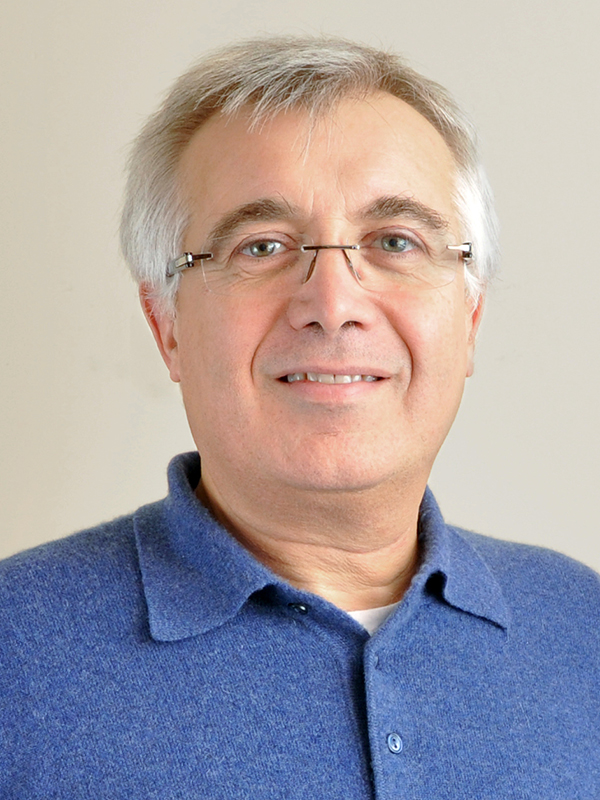Dr. Éric Cohen
The Nuts and Bolts of Virus-Host Interactions
Institut de recherches cliniques de Montréal and Université de Montréal
 Dr. Éric Cohen, Canada Research Chair in Human Retrovirology and Professor at the Institut de recherches cliniques de Montréal and at Université de Montréal, digs right down to the basic levels of viral-host relationships. It’s the complexity of these relationships and what they tell us about the virus and the human immune system that has kept him in this field of research for almost 30 years. Now, as the leader of a team supported by the Canadian Initiative for HIV Cure Research, the Canadian HIV Cure Enterprise (CanCURE), Dr. Cohen is applying his knowledge in basic science to strategies for preventing HIV from establishing and maintaining infection. “Any cure for HIV will be based on interfering with the ability of the virus to persist in the host,” explains Dr. Cohen. “If we identify critical virus-host interactions that we can target, we could eventually develop anti-persistence strategies.”
Dr. Éric Cohen, Canada Research Chair in Human Retrovirology and Professor at the Institut de recherches cliniques de Montréal and at Université de Montréal, digs right down to the basic levels of viral-host relationships. It’s the complexity of these relationships and what they tell us about the virus and the human immune system that has kept him in this field of research for almost 30 years. Now, as the leader of a team supported by the Canadian Initiative for HIV Cure Research, the Canadian HIV Cure Enterprise (CanCURE), Dr. Cohen is applying his knowledge in basic science to strategies for preventing HIV from establishing and maintaining infection. “Any cure for HIV will be based on interfering with the ability of the virus to persist in the host,” explains Dr. Cohen. “If we identify critical virus-host interactions that we can target, we could eventually develop anti-persistence strategies.”
Replication and transmission efficiency of HIV is affected by two things; the ability of the virus to have access to host factors (cellular proteins that HIV depends on for replication and transmission) and the virus’ ability to counter host defense mechanisms. On a molecular level, human cells encode antiviral proteins (called restriction factors) that suppress HIV replication in human cells. At the same time HIV has evolved a set of proteins (accessory proteins) whose role is to modify the cellular environment to promote immune evasion—paving the way for efficient viral replication and transmission. Dr. Cohen and his lab study the interplay between viral accessory proteins (specifically VIF, VPR, VPU and Nef) and host antiviral proteins.
His recent work has investigated the role of the viral protein U (VPU) which appears to counteract the antiviral activity of a restriction factor called Tetherin. Tetherin’s function is to prevent virus particles from budding off the cell surface and moving on to infect other cells, while VPU promotes the release of these virus particles. But VPU also plays a role in inhibiting the host immune response. “Besides understanding how these restriction factors inhibit HIV replication, we are also looking at how these factors promote other types of responses,” explains Dr. Cohen. “By downregulating Tetherin at the cell surface, it negatively affects antibody-dependent cell-mediated cytotoxicity (ADCC, an innate immune response) which means that VPU is protecting infected cells from an immune response.”
Dr. Cohen’s work is also investigating the relationship between VPU and plasmacytoid dendritic cells (PDCs)—human cells that are involved in the antiviral immune response. “PDCs can sense the virus and basically trigger antiviral defenses in the form of production of interferon, preventing the virus from disseminating.” But natural stop-gaps exist to prevent the production of too much interferon and Dr. Cohen suspects that VPU is exploiting this pathway to prevent an effective immune response. The results of this work are forthcoming.
Though his research investigates the most basic level of HIV-host interaction, Dr. Cohen moves upwards in complexity as he goes, to ensure his work has real world applications. “Once we make basic discoveries in experimental models, we go into primary cells and eventually move into a humanized mouse model (a mouse with a human immune system) where we look at things in vivo. Eventually, we use biological samples from HIV infected individuals. We work on very basic mechanisms and then validate them in the most physiologically relevant system that we can have.” HIV’s ability to establish viral reservoirs in long-lived immune cells despite antiretroviral therapy represents the primary source of viral persistence and the barrier to an HIV cure. Dr. Cohen’s hope is that by elucidating the fundamental molecular pathways of virus-host interactions, we can prevent the establishment of infection and reservoirs right from the start.
The Canadian Association for HIV Research (CAHR), the CIHR HIV/AIDS Research Initiative, the Canadian Foundation for AIDS Research (CANFAR), the CIHR Canadian HIV Trials Network (CTN) and the Canadian HIV Vaccine Initiative (CHVI) Research and Development Alliance Coordinating Office (ACO) would like to thank Dr. Cohen for his significant contributions to our understanding of HIV. His work is part of a larger Canadian research effort that is making a difference in the lives of those affected by HIV in Canada and around the world.
- Date modified: